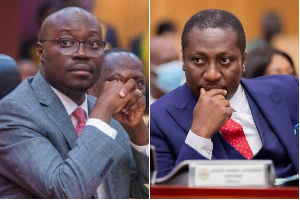The recent announcement by the NPP Government in Ghana, agreeing to a 23% rise in base pay from January 2024 to June 2024, followed by an adjustment to 25% in the same year, has significant implications for the country's political and economic landscape.
This move can be seen as a strategic decision by the NPP, particularly benefiting Vice President Mahamudu Bawumia, who is leading the NPP party's election campaign. However, it also presents potential challenges for the NDC’s
flagbearer, John Mahama, especially considering the country's current economic situation. I hope this article helps my fellow Ghanaians to have a cautious and balanced view of this pay increase.
This strategic move by the NPP government presents a multifaceted scenario. On one hand, it appears as an immediate financial boon for public servants, potentially bolstering the NPP's appeal among a key voter demographic in the run-up to the elections. On the other hand, this policy could be construed as a strategic encumbrance and a poison pill for the NDC, potentially inheriting a
challenging fiscal landscape. Furthermore, it raises critical concerns about its long-term economic viability and the possible ramifications for Ghana's fiscal stability.
Strategic sweetener for Bawumia's campaign:
The announcement presents immediate strategic benefits for the NPP’s electoral campaign by enhancing its electoral appeal through a multifaceted approach. It amplifies the party’s appeal to voters but also serves as a potent tool in its economic messaging.
Moreover, while this action might enhance the NPP/s image as a party sympathetic to economic challenges, it raises questions about the authenticity of this perception, especially considering the timing of the announcement and its
implementation, the current state of the economy, and whether the party has truly demonstrated a commitment to addressing the economic plight of the people.
Economic appeal:
The salary increase can be perceived as a direct appeal to public sector workers, a significant voting bloc. By boosting their income, the NPP government, under Bawumia's campaign leadership, positions itself as a worker-friendly administration, potentially garnering more support in the upcoming elections.
The policy could be seen as a targeted Influence of the civil service workers. It may be seen as a strategic move to influence a key demographic – public sector workers – whose support can be pivotal in elections. This targeted financial benefit could potentially sway opinions in favour of the NPP, particularly among the beneficiaries of the pay rise.
Economic messaging:
The move allows Bawumia to craft a narrative of economic progress and concern for the welfare of ordinary Ghanaians. In a period of global economic challenges, this gesture could be portrayed as a commitment to safeguarding the livelihoods of citizens.
Strengthening party image and possible negative long-term economic impact:
The decision might bolster the party's image in the short term but could lead to long-term economic repercussions, such as increased government spending and debt. Voters should critically evaluate the sustainability of such measures.
While the pay rise might paint a picture of economic progress, it is essential to juxtapose this with the overall economic management by the NPP government.
Issues like national debt, currency depreciation, huge budget deficits, and previous fiscal policies should be considered to assess the full economic narrative.
Potential headache for John Mahama:
The magnitude of the civil service base pay increase while presenting a possible short-term gain for public servants and the NPP, also presents a potential quagmire for John Mahama should he win the upcoming elections. Mahama will have the prospect of dealing with an inflated budget deficit, which could severely constrain his administration's operational flexibility and necessitate tough fiscal decisions.
Additionally, the policy's inflationary effects and the resultant pressure on interest rates present significant hurdles in maintaining economic stability and fostering growth. Moreover, Mahama faces a delicate political balancing act: he must navigate the complexities of critiquing this pay rise without disenfranchising public sector workers, all while crafting a viable strategy to manage these economic repercussions in a manner that blends populism with pragmatic fiscal management.
Budget deficit concerns:
The increase in base pay, while politically appealing, may exacerbate Ghana's budget deficit. For John Mahama, inheriting a bloated budget could limit his administration's ability to implement its agenda and require difficult fiscal adjustments.
Fiscal responsibility: An inflated budget deficit restricts the government's ability to spend on crucial sectors like healthcare, education, and infrastructure. This would be a significant challenge for Mahama, a true nation-builder, who would need to address fiscal imbalances while delivering on
campaign promises.
Debt sustainability: A larger deficit could lead to issues with debt sustainability, impacting Ghana's ability to secure favourable terms in international financial markets.
Inflation and interest rate pressures:
Economic instability: Increased spending power might stimulate demand, which could fuel inflation if economic supply does not match. Higher inflation often necessitates increased interest rates, which can slow down economic growth and increase the cost of borrowing, affecting both individuals and businesses.
Political narrative challenges:
Inflation and interest rate pressures: The increased spending power could fuel inflation, leading to higher interest rates. This would pose a significant challenge for Mahama, as managing these economic variables would be crucial for maintaining economic stability and growth.
Balancing act: Mahama would need to navigate the political landscape carefully, criticizing the fiscal irresponsibility of the pay rise without alienating public sector workers, the beneficiaries. This requires a nuanced approach and a clear alternative economic plan. Mahama would need to articulate a clear plan for managing the fiscal implications of such policies, striking a balance between populism and economic pragmatism.
Announcement timing suspicions:
The timing of the pay increase announcement, just before an election year, opens the policy to scrutiny and raises substantial questions about its underlying intentions. It suggests a possible prioritization of electoral gain over economic pragmatism, a concern that warrants careful consideration by both the electorate and economic analysts.
Electoral motivations:
Implementing a significant pay rise right before an election year can be perceived as a strategic move to curry favour with voters, particularly public sector employees. This raises concerns about whether the decision is driven more by electoral ambitions than by sound economic planning.
Historical precedence:
It's not uncommon in various political contexts for incumbent governments to introduce policies perceived as beneficial to the electorate in the run-up to an election. This pattern, observed globally, casts doubt on the sincerity of such measures and whether they are truly in the best interest of the economy or merely short-term incentives to secure votes.
Economic policy analysis:
Scrutinizing the timing also involves analysing the broader economic context. If the decision to increase pay does not align with the current economic indicators or fiscal health of the country, it further fuels the argument that the move is primarily politically motivated rather than a well-considered economic policy.
Public perception and trust:
The timing can significantly impact public trust in the government. If the electorate perceives this move as a transparent attempt to win votes, it could backfire, leading to scepticism about the government's priorities and overall economic management strategies.
Long-term implications:
Another aspect of the timing is its potential long-term impact. A decision made with an eye on immediate electoral gain might neglect the long-term fiscal health of the country, leading to adverse effects that extend well beyond the election cycle.
Why Ghanaians should be wary:
The announcement of a 24% to 25% base pay rise for civil servants in an election year calls for a cautious and sceptical response from the Ghanaian electorate. Understanding this decision within the broader socio-economic context, both short-term and long-term, is crucial. This section will specifically focus on why Ghanaians should approach this development with wariness.
Economic track record:
The broader economic performance under the NPP government, including issues like national debt levels and inflation rates, should be a critical factor in assessing the sincerity and sustainability of the pay rise. Voters should consider whether short-term financial gains outweigh the long-term economic implications, such as increased national debt and potential austerity measures in the future.
Socio-economic consequences:
Beyond the immediate benefits, the socio-economic impact of such policies, including their effect on inequality, poverty, and overall economic stability, must be considered.
Election cycle politics:
The pattern of introducing appealing policies close to elections is a common political strategy. Ghanaians should evaluate whether such decisions are in the nation's best interest or merely electoral tactics.
Conclusion:
In conclusion, the NPP's decision to increase base pay under the leadership of Akuffo Addo could be seen as a tactical move with immediate electoral benefits. However, it also presents a complex scenario for the country's future economic management, particularly if John Mahama wins the 2024 elections. The situation requires careful navigation from both parties, balancing short-term political
gains with long-term economic sustainability.
While the pay rise might seem beneficial in the short term, it is crucial for Ghanaians to critically assess the broader economic context and the government's overall track record. This scrutiny will help ensure that electoral decisions are made based on a comprehensive understanding of the implications for the country's future.
Opinions of Tuesday, 21 November 2023
Columnist: John C. Wussah



















